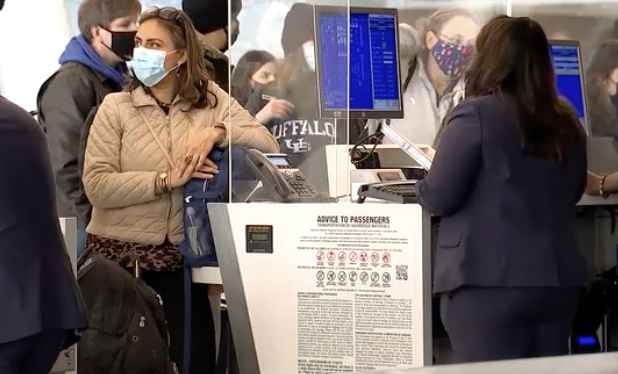Omicron impacting holiday events
[anvplayer video=”5080030″ station=”998122″]
Christmas Eve Mass at the Basilica of St. Mary was among the events impacted by COVID concerns.
The Archdiocese strongly recommended safety measures but didn’t issue any mandates.
"Minnesota’s current COVID positivity rates have not waned as we had hoped," said Archbishop Bernard Hebda in a recorded video on the Archdiocese’s website. "I am once again strongly recommending that parishioners gathering for mass or for other large events wear face masks and physically distance when possible."
This holiday weekend, with the Omicron variant surging across the country, airline travel nationwide were affected, with two major airlines forced to proactively cancel Christmas Eve flights.
"We’re just trying to stay extra safe from people, I guess," said one passenger.

[KSTP]
ABC News is reporting that commercial air carriers have canceled more than 400 flights across the county because of Omicron spikes affecting flight crew staffing.
The network says Delta Airlines canceled more than 150 flights, with United Airlines canceling 112.
As of late Friday night, the Minneapolis-St. Paul International Airport says about thirty flights have been canceled, and fifty-one have been delayed.
Travel experts recommend you check with your airline before you head to the airport to get updated information on your flight.
Some in the medical community are recommending that people require negative tests from holiday guests, especially if they’re not vaccinated.
"I would ask them to get a test when they arrive," explains Dr. Ashish Jha, Dean of Brown University School of Public Health. "I would test them while they’re there, as long as they can get rapid tests and use it, I think that’s a reasonably safe thing to do."
The Centers for Disease Control says nationwide, Omicron’s daily infection peak is now at 176,000 cases.
That’s higher than Delta’s peak of 164,000 during the summer.
Hospitals and frontline workers say they’re feeling the pressure.
"We’re overly exhausted," declares Jahmaal Willis, an emergency department nurse at Providence St. Mary Medical Center. "It’s starting to look like last year at this time right now. It’s kind of a PTSD situation."
From New York City to Honolulu— people are lining up for hours to get tested.
The Biden administration is promising a half-billion tests but says they won’t be available until after the holidays.
The rise of the Omicron variant appears to be motivating more people to get vaccinated.
"People are paying attention now," says Ian Kennedy from Oahu. "I think everybody’s a little bit nervous and scared. It’s the holidays and certainly this one is transmitting much quicker than all the others."
The Minnesota Department of Health estimates that Omicron is now the dominant strain in the state.
MDH says nearly 3.5-million Minnesotans are fully vaccinated.
In a statement issued earlier this week, Commissioner of Health Jan Malcolm says the state "is preparing for an increase in COVID-19 cases in the coming weeks driven by the Omicron variant… (Its) quick rise underscores
the importance of everyone taking steps to slow its spread, so we don’t overwhelm our already stressed health care system."
The Food and Drug Administration has now approved a second COVID-19 pill, this one from Merck, shown to reduce the chance of severe illness by 30%.
The agency is recommending first— the use of Pfizer’s anti-viral pill, shown to be 89% effective in preventing hospitalization and death in people affected with the coronavirus.
MDH says the Pfizer pill will be here soon, but it’s unknown how many the state will receive.
Health officials say these anti-viral pills don’t replace the need to be vaccinated— and that the supply of the Pfizer pill will be limited at first.
"I think in the long run, it’s a game changer, I think. I don’t use that term lightly," Jha says. "I think it can end up making a really enormous difference."